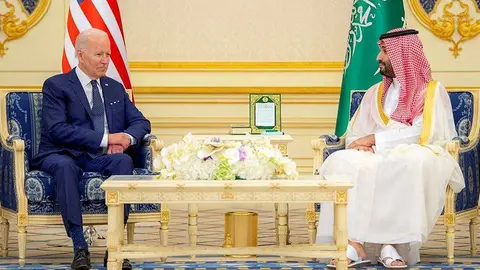US reaffirms its commitment to the Gulf once again

At a ministerial meeting of the Cooperation Council for the Arab States of the Gulf (GCC) in the Saudi Arabian capital, Riyadh, the United States has affirmed its commitment to its Gulf Arab partners, as Secretary of State Antony Blinken declared: "The United States is in this region to say that we remain deeply interested in partnering with all of you". These statements come just days after diplomatic relations between Saudi Arabia and Iran were resumed thanks to Chinese mediation, which may mean a loss of US influence and role in the region, as long as the dispute is related to Iran.
Among the issues on the agenda were the region's most heated conflicts, such as Yemen, Sudan, Palestine and Syria. Prior to the GCC meeting, Blinken held private talks with Saudi Prince Faisal bin Farhan, in which they agreed to continue working to combat terrorism through the Global Coalition against Daesh, to support a lasting peace in Yemen, to cooperate to end the fighting in Sudan, and to promote integrity, security and stability in the region. The Secretary of State also met with Saudi Crown Prince Mohammed bin Salman upon his arrival in Riyadh, with whom he also emphasised the importance of initiating dialogue to achieve peace in Yemen, supporting US evacuations in Sudan, and advancing cooperation.

In early May, US Secretary of Homeland Security Jake Sullivan also travelled to Riyadh to meet with his Indian, Saudi and Emirati counterparts to discuss the current situation in the Persian Gulf region and their relations with New Delhi. According to various sources, the trip was preparatory to Secretary Blinken's meeting with the GCC.
Gulf states such as the United Arab Emirates (UAE), Qatar, Bahrain and Kuwait are increasingly gaining strength on the international stage for their exploitation of natural resources and their role as mediators in some of the region's conflicts. They also want to expand alliances and share economic and security interests with the United States. The US has long maintained alliances mainly with the Qataris, whom it considers "important non-NATO allies", and with the Saudis and Emiratis through bodies such as the Terrorist Finance Targeting Centre, which locates and disrupts the flow of funds to terrorists.
Saudi Arabia is a major US partner in the fight against al-Qaeda in the Arabian Peninsula and a major oil exporter, with which it works closely on security and stability in the Middle East through military exercises such as Eagle Resolve 23, which began on Saudi soil in May. In addition, the Saudis have been working hard in the region to contest leadership with the UAE, showing commitment to a solution to the conflict in Yemen and providing humanitarian aid.
For their part, the Emiratis and Americans share interests in border security, economics, culture, politics and defence, among others. To neutralise terrorism and other threats posed by Iran and other states in the region, they plan to share intelligence.









